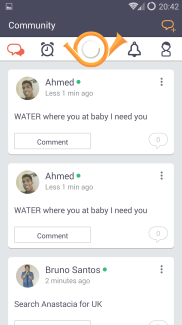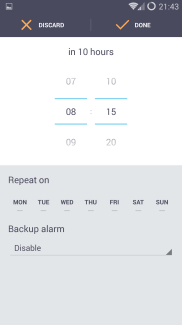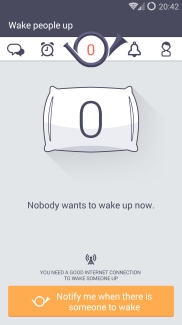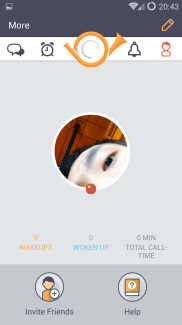Bored of the immutably ear-splitting alarm in the morning? Miss talking with real people? Time to substitute your default alarm app!
Wakie is specially designed for waking other people (a social alarm clock). The idea was originated from an award-winning Russian service, called Budist (Будист). The sleeper can set an alarm in advance and a “call” will be ready in time when another user wakes the sleeper by conversation.
Wakie consists 5 parts: Community, Alarms, Wake people up, Activity and More.
Community is for users to greet each other, or, mostly, to find someone that has just waken them up. You can post a reply, or to post a brand new topic. It’s like a small forum and new posts arise every minute. You are supposed to write in English since it aims to be an international app.
Wake people up takes you to someone who set the alarm. You have one minute to perform your waking skills, as you wish: creatively, humorously or emotionally. Yet it seems to be fun, I didn’t connect to anyone ever. There’s a line in small size saying “You need a good internet connection to wake someone up”, I don’t know if it assessed my network quality or what. I therefore can’t comment how it feels to wake a person on the other side of the earth, quite a pity.
Activity is like a notification center, as the icon suggests. Once there’re updates about the posts you participated, you are pushed a notification here so you can get back to the discussion in no time.
More is all about yourself. The statistics of how many people you’ve waken and how many people have waken you, and the time elapsed on both sides.
There’re still a few words I would like to point out bluntly. Wakie is an imitation to Budist, it does protect user privacy, has implemented most of the features of Budist, and delivers the novel experience to getting out of the bed. But there’re still some disadvantages. The size of Budist app is only 8.5 MB, while Wakie is 21MB; some users reported their app crashes in Activity tab; some user get calls ended unexpectedly.
From the desperate searching of people in Community I find it’s not just about curiosity, it’s also about the desire to know new people but fear to get acquainted in real life at the same time. People get lonely, but people also get comforts, no matter where they live and the possibility they’ll ever interact again. That’s the charm of technology, but merits pondering of our interpersonal relationship as well.










